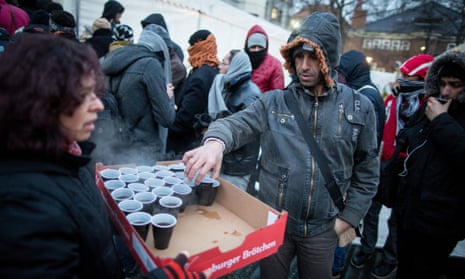If Europe’s big test in 2015 was the refugee crisis, integrating the newly arrived will be 2016’s. This will require the type of Wir schaffen das (we can do it) message that German chancellor Angela Merkel has been sending out. The refugee crisis has highlighted a historical fact: Europe’s cultural, ethnic and religious diversity will increase in a transformative way in the years and decades to come. Which makes it a good time also to open a healthier more cool-headed debate about our collective identity.
Sudden surges in migration pose a real challenge, but it’s worth remembering that we have been here before. Think of the huge population transfers after the world wars, or the arrival of immigrant workers in the 1950s and 60s – to France and Britain from former colonies, or to Germany from Turkey.
What is new is merely the pace of the inflow and the dramatic circumstances under which people are being driven to Europe. The underlying questions remain more or less the same, though: how to accept difference while upholding democratic governance and social standards. How to define national identities within a larger collective project of mutually shared values – key pillars of what Europe is supposed to be about.
Much is said about integrating new Muslim populations, and that question has become increasingly fraught by being unhelpfully conflated with the fear of terrorism. If we step back a little, it’s striking that the debate last year mostly focused on managing flows and obsessing about security. For some, the urgent human imperative was to save people from drowning at sea. For others, it was the xenophobic rush to put up fences and push families away with police dogs and truncheons. Europeans suddenly saw both the worst and the best in themselves and in their politicians.
But none of this fully addresses the longer-term issue of how a hopeful future can be built on the new diversity. Today around 7% of the European Union’s population was born outside the EU. More than a million refugees and migrants arrived in Europe in 2015, but that’s a tiny proportion – less than 0.2% – of the EU’s total population. Still, diversity will continue to increase in most European states because of the scale of the pressures driving people out of their homelands. As in the 19th century (the first globalisation), this current one is described as an age of migration – except that this time it isn’t flowing out of Europe (to the Americas) but to Europe (from the Middle East, Africa and Asia).
Diversity is dealt with in different ways across Europe. The British or German “multicultural” models are contrasted with the French “assimilationist” approach, but problems exist everywhere. Long admired for their open-arms policies, Scandinavian countries have started to rethink. Sweden has even brought in identity checks on travellers from Denmark.
Some east European leaders have openly argued that Christian traditions are incompatible with the arrival of Muslims. Politicians in some west European states haven’t done much better. The former French president Nicolas Sarkozy said his “Christmas wish” to fellow French people was that they would “remain French” – as if that identity was under threat.
On the other hand, there has been a spectacular, heartwarming mobilisation of volunteers, NGOs and human rights organisations to help refugees with clothes, food and emergency shelter. And when refugees are compared to terrorists, a chorus of Europeans has rightly fought back against the paranoia.
But it is hard to reassure the many Europeans who struggle to see how diversity can be truly dealt with. There is a growing sense that a certain way of life is about to disappear. Simply telling people that diversity must be embraced, or that immigration is needed due to demographic change, overlooks the lack of preparation, the concrete difficulties and the fears that can arise from ignorance or stereotyping.
It is a safe bet that politicians will not supply the answers – they are too stuck on short-termism. Nor will high-minded reminders of European charters be enough. If a promising dynamic can be created, it must come from civil society – and serious media organisations have a role to play. Now is the time to launch a pan-European citizens’ debate on diversity. This would help to prepare for a future where our democracies can resist populist pressures or social disintegration. Saying that migrants, whatever their cultural background, must abide by laws as much as be protected by them, may be stating the obvious but it also raises sensitivities and should therefore be part of that debate. Using online platforms and the linking of communities beyond borders, to share experiences, life stories, to map out problems areas and the ways people can work to overcome them could be a good option.
Our continent is changing, but the debate is happening within national silos. Why is it that those who help refugees in Calais have so few organised contacts with those who do the same in Berlin? Or that virtually no one from liberal west European circles has engaged with those, Hungarians and others, who have become convinced their nation is being “swamped”?
Is there a way to explore the notion of being “hyphenated Europeans” – Turkish-German, Algerian-French or Asian-British, just as one can be African-American or Italian-American? Diversity, as experienced across Europe, by Europeans and non-Europeans alike, is the next looming horizon. It is a compelling, gripping transformation – a story that we are all part of, and one we should start talking about in new ways.

